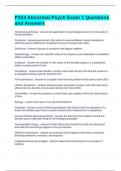-
1. Exam (elaborations) - Abnormal psych exam #1 review questions with latest update
-
2. Exam (elaborations) - Abnormal psych exam 1 (ch 1-6) questions with correct answers
-
3. Exam (elaborations) - Abnormal psych exam 1 fsu questions and answers
-
4. Exam (elaborations) - Abnormal psych exam 1 wustl questions with correct answers
-
5. Exam (elaborations) - Abnormal psych exam 1, abnormal psychology test 1 questions and answers
-
6. Exam (elaborations) - Abnormal psych exam 3 - ch. 8, 9, 10, 11 questions with latest update
-
7. Exam (elaborations) - Abnormal psych exam questions with correct answers
-
8. Exam (elaborations) - Abnormal psych. exam 1 ch. 1-3, 16 questions with verified answers
-
9. Exam (elaborations) - Abnormal psychology - exam 3 questions with correct answers
-
10. Exam (elaborations) - Abnormal psychology (exam #4) questions and answers
-
11. Exam (elaborations) - Abnormal psychology 4610 - exam 1 questions and answers
-
12. Exam (elaborations) - Abnormal psychology ch. 5-8 exam questions with latest update
-
13. Exam (elaborations) - Abnormal psychology chapters 1-7 exam questions with latest update
-
14. Exam (elaborations) - Abnormal psychology exam #1 questions and answers
-
15. Exam (elaborations) - Abnormal psychology exam 1 (ch 1-3) questions with complete solutions
-
16. Exam (elaborations) - Abnormal psychology exam 1 (chapters 1-5) questions with verified answers
-
17. Exam (elaborations) - Abnormal psychology exam 1 (multiple choice) questions with correct answers
-
18. Exam (elaborations) - Abnormal psychology exam 1 questions with latest update
-
19. Exam (elaborations) - Abnormal psychology exam 2 (uark) questions and answers
-
20. Exam (elaborations) - Abnormal psychology exam 2 multiple choice questions with correct answers
-
21. Exam (elaborations) - Abnormal psychology exam 2 practice questions with correct answers
-
22. Exam (elaborations) - Abnormal psychology exam 2 questions and answers
-
23. Exam (elaborations) - Abnormal psychology exam 2 questions with verified answers
-
24. Exam (elaborations) - Abnormal psychology exam 3 questions with latest update
-
25. Exam (elaborations) - Abnormal psychology exam 5 questions with correct answers
-
26. Exam (elaborations) - Abnormal psychology: exam dsm-5 disorders questions and answers
-
27. Exam (elaborations) - Abnormal psychology exam questions and answers
-
28. Exam (elaborations) - Abnormal psychology exam questions with verified answers
-
29. Exam (elaborations) - Abnormal psychology overview & history - exam 1 questions and answers
-
30. Exam (elaborations) - Abnormal psychology test 1 exam questions with latest update
-
31. Exam (elaborations) - Abnormal psychology test 1 study guide questions and answers
-
32. Exam (elaborations) - Abnormal psychology test 1 study guide questions and answers
-
33. Exam (elaborations) - Abnormal psychology test bank exam questions and answers
-
34. Exam (elaborations) - Abnormal psychology unit 1 exam questions with correct answers
-
35. Exam (elaborations) - Abnormal psychology unit 3 test exam questions and answers
-
36. Exam (elaborations) - Abnormal psychology vocabulary exam questions with correct answers
-
37. Exam (elaborations) - Abnormal psychology, exam revision (quiz) questions and answers
-
38. Exam (elaborations) - Essentials of abnormal psychology exam 1 questions with latest update
-
39. Exam (elaborations) - Exam 1, chapters 1-4, advanced abnormal psychology questions and answers
-
40. Exam (elaborations) - P324 abnormal psych exam 1 questions and answers
-
41. Exam (elaborations) - Ps280 abnormal psychology final exam questions with correct answers
-
42. Exam (elaborations) - Psy 320-abnormal psychology exam 1 questions and answers
-
43. Exam (elaborations) - Psy 341 abnormal psychology exam 1 questions and answers
-
44. Exam (elaborations) - Psy30010 abnormal psych - exam revision questions and answers
-
Show more




